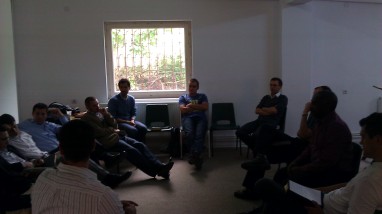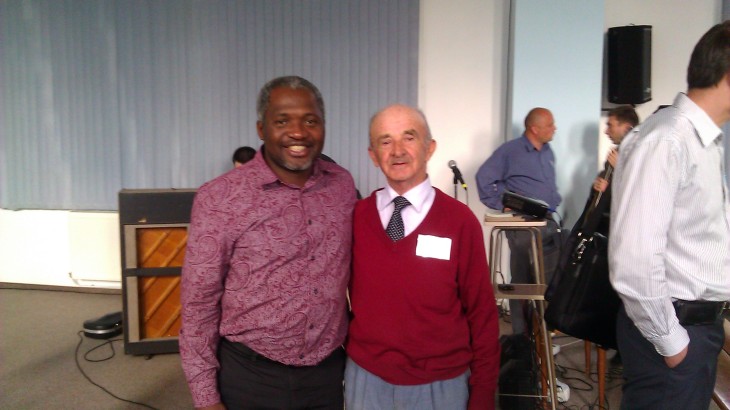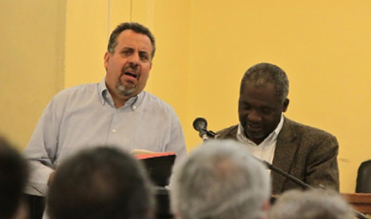
One of the most helpful things missionaries can do as they prepare to serve overseas is to go through cross-cultural training. Different mission agencies might go about this differently, but there is agreement that before a missionary sets out to leave lives in a different culture, there needs to be proper preparation. Thus, Cross-cultural training helps introduce the missionary candidate to the challenges they will or might face as they leave live in a culture different from their own.
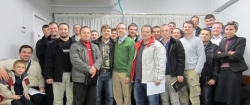
In Genesis 12:3, God said to Abraham, “. . . in you all the families of the earth shall be blessed.” Commenting on this particular text, Paul says, “And the Scripture, foreseeing that God would justify the Gentiles by faith, preached the gospel beforehand to Abraham saying, ‘In you shall all the nations be blessed.’ So then, those who are of faith are blessed along with Abraham, the man of faith” (Galatians 3:8-9). Paul definitely connects the promise to Abraham and our faith in Christ. Christ became a curse for us so that in him, the blessing of Abraham might come to us so that we might receive the promised Spirit through faith (Gal. 3:13-14).
God is even now continuing to work to bring the blessing of Abraham to the nations and we are delighted to be part of it.
Today was another busy day of ministry here in Iasi. We had breakfast at 8:30 and group devotions at 9am. The ladies in the group travelled to one small village to visit some poor women there. The men stayed back and met with a group of 8 pastors from different churches in the area. Some of them came from 200 KM away (about a 2 and a half hour drive). They asked us many questions about ministry related issues. We realized that these pastors have different views and approaches to ministry. Common among them was the need to be biblically grounded in all that they do. Meeting with this group highlighted again the need to help train pastors in this area.
We had lunch with the pastors in the afternoon and went from there to teach. Normally, our teaching sessions begin at 4pm with singing, a devotional, more singing, announcements, and then dismissal for classes. We normally take a break of 45 minutes to each together. Class end at 9pm each evening. Our class sizes range from 8-12 students in each group. We have three separate groups of students.
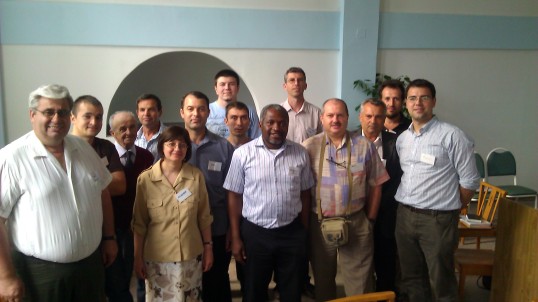
My class
My class today was very encouraging. I realized how much I have missed being in the classroom daily. It is such a joy to teach and have the opportunity to explain the Word of God to people who are asking to know more. More so, it is encouraging to see how they are learning and accepting new and difficult concepts in Biblical Interpretation. While explaining the syntax of one of Paul’s passages, an older man in the group declared, “no wonder the apostle Peter found Paul to be difficult.” We had a good laugh at that.
Continue to pray that the lessons will be understood as they have been and that these students will commit as they have promised to use the skills to study the word with diligence.
Grace to you
Philemon
When students leave their various countries to pursue studies in America, they arrive with certain beliefs. If they are Christians, more likely than not, they had experienced life with missionaries in their country, and come to America thinking (falsely so) that the church in America will be filled with people with the same mindset as the missionaries they had met. Those missionaries they had met are, for the most part, interested in the lives of the nationals, curious about their culture, wanting to understand why they do what they do, and welcome them into their homes. When they arrive in America, they quickly learn that this is not generally true of Americans, and there begins a confusing journey for them as they seek to fit into the body of Christ here. Several years ago my wife and I had some international students over to our home for a meal and they told us that was their first visit in an American home in their two years of stay in the US. I was shocked but that is the fact. I have heard the same from many more international students. My aim here is to suggest a helpful role for the international students in the preparation of our missionaries as we send them to serve in those various countries.
God has brought many nations to the US and into the church in this land. What an opportunity that brings to the American church as we seek to impact the church globally. Yet, many international students are shocked when they come across people preparing to go and serve as missionaries in their countries, but they never take a minute to get to know them or even ask what life is like back home. A common comment among international students is that if future missionaries are not able to relate to them here in their own homeland, how in the world do they expect to fit in and relate to people in their mission context? The presence of international students in our congregations is a gift from God, and can be used to better equip our global missionaries.
In last week’s post, I made the proposal that we should be purposeful in our training of missionaries for cross-cultural ministries. One of the ways to do this is to be culture-specific in our missionary training. If we engage the many international students present here, that culture-specific training will be obtainable. It won’t take much to have international students come to our training centers or to our churches and share with our missionaries as a way of equipping them for more effective service.
How can this be done in practice? Several possibilities:
Through the local church, have international students play a key role in the training of your missionaries. A local church, through the missionary training program, can require their missionaries to make contact with international students from the country to which they are planning to go. They can spend time with them over a period of 8-12 months, learning about their future host culture. These students normally have contacts back home and can chase down information that will be helpful for the missionary as he or she goes.
Mission agencies, as part of their cross-cultural training, can bring in students from other countries (chosen according to the locations of the missionaries in training) to come and take part in the orientation of their missionaries. Who would you want orienting you to the culture of your ministry? An American who has read books about the culture and maybe spent some years there, or a national from that particular culture? Often, these students have so much to share, but lack the opportunity to do so.
There are benefits to this approach in missionary orientation. This kind of ministry shows that we do appreciate those who have come to us from other countries and believe that there are things they can teach us about their own contexts. It helps international students fit into the church better when they cease from being visitors during their time of studies, and to actually being part of helping prepare missionaries for their home countries.
They give us an honest picture of how our labors in their homeland are going. They have grown up seeing missionaries work, and they know the growth of the church. They know how the church is struggling and what can be done to help. They have alternate views about how the gospel is progressing in their own country. Putting together how they see things and what we know of our own mission work in the area will help us keep from making the same mistakes over and over.
Again, let us not neglect the presence of the nations in our churches as we prepare missionaries to serve the nations.
Philemon

Tomorrow I leave for Athens Greece with my good friend, Pastor Matthew Henry of
Missio Dei Fellowship in Kenosha. We will arrive in Athens on Saturday, preach at
some ethnic churches on Sunday, and spend next week leading mini conferences.
Pastor Matt will lead seminars on “Theology, Preaching, and the Pastor—An Urgent Call
to Be Men Controlled by the Word of God.” I will be teaching on “Unity of the Bible.”
Our purpose is to follow up on the trip we took last May and also to lead mini
conferences with various church leaders. Training Leaders International will launch a
Theological Training Center in Athens in January so we are laying the groundwork for
that. Many pastors in Athens lack theological education and do not think that they
need it. We will help them see the importance of studying to be better equipped for
teaching and preaching.
A Strategic Opportunity
Here is our schedule, sent by the Southern Baptist missionary with
whom we will work. You can see what a strategic opportunity this is.
We have an opportunity to teach church leaders from 6 language
groups. Training Leaders International will start a center to train
pastors for these language groups, sending teams to Athens three times
a year for 3-4 years.
- Monday, November 14: Arabic Language
- Monday, November 14: Farsi Language.
- Tuesday, November 15: English Language (for Africans, Filipino, and other English speakers)
- Wednesday, November 16: Hindi or Urdu Language
- Thursday, November 17: Albanian Language
- Friday, November 18: Romanian Language
Pray that:
- Our ministry will be well received by the brothers in
Athens. - We will teach with clarity and that God will be pleased to
accomplish his purpose for Athens through us. For many to
see the need for theological education in their lives and
churches. - We will make good progress in laying the ground work for
TLI training center, which begins in January. - Travel mercies, and for Linda and the kids to be well back
at home.
